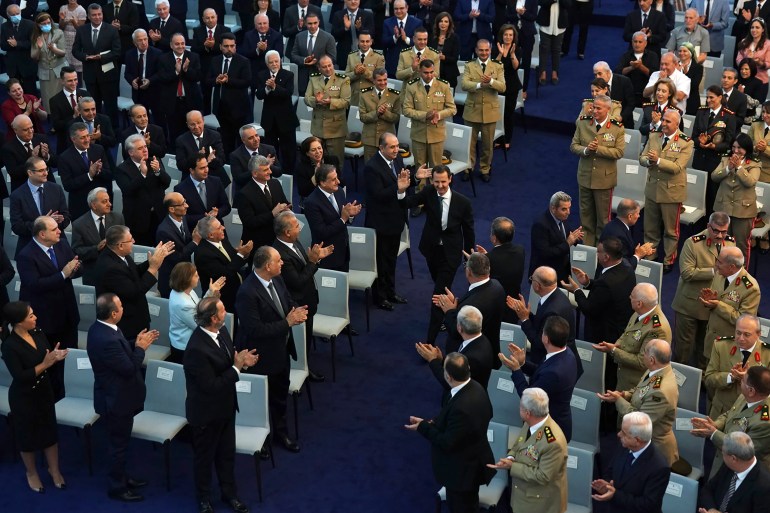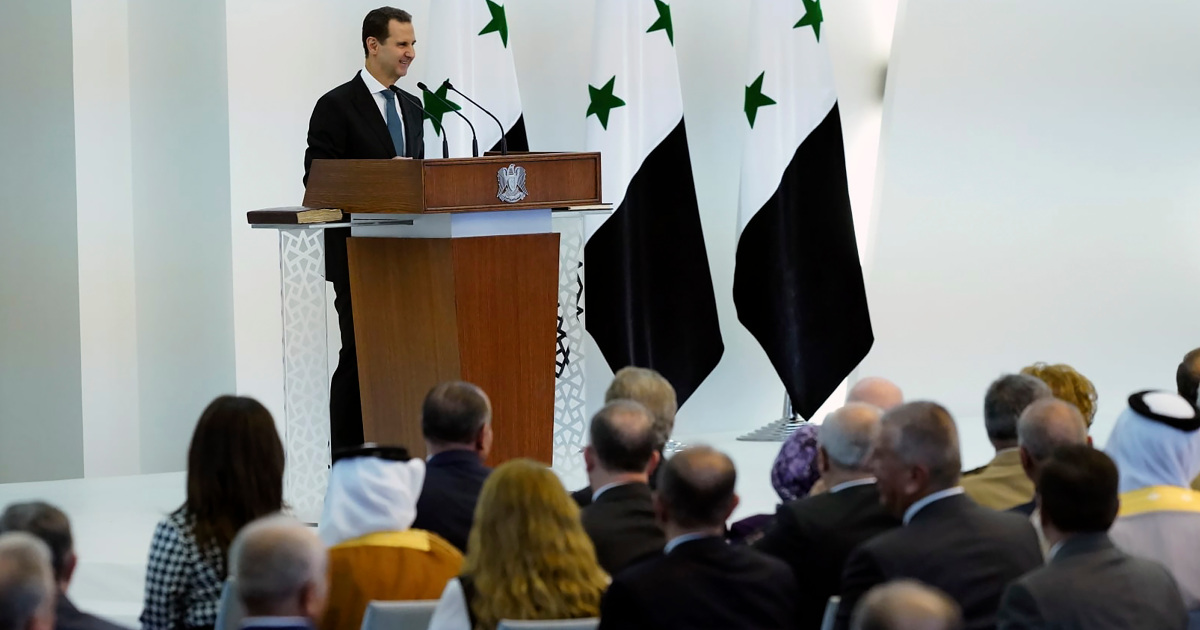Syrian President Bashar al-Assad was sworn in after elections in May, described by the opposition as illegitimate and a sham.
Syrian President Bashar al-Assad has been sworn in for a fourth seven-year term in the war-torn country, after winning more than 95.1 percent of the votes cast in government-held areas.
The May 26 elections were described by al-Assad’s opponents and Western countries as illegitimate and a sham.
Saturday’s swearing-in ceremony was held at the presidential palace in Damascus and attended by more than 600 people, including clergymen, members of parliament, political figures and army officers.
The elections “have proven the strength of popular legitimacy that the people have conferred to the state”, al-Assad, 55, said in his inauguration speech.
They “have discredited the declarations of Western officials on the legitimacy of the state, the constitution and the homeland”, he added.
Al-Assad took over in 2000 after the death of his father, Hafez, who had seized power in 1970 in a bloodless military coup.
His re-election in a landslide was never in doubt. Al-Assad garnered 95.1 percent of the vote in the election, in which officials said turnout was 78.6 percent of some 18 million registered voters. There were no independent monitors of the one-day vote.
The competition was symbolic, with two little-known candidates running against al-Assad. In the previous polls in 2014, he had won nearly 89 percent of the vote.
His new term starts with the country still devastated by 10 years of war that killed hundreds of thousands and sliding deeper into a worsening economic crisis.
Nearly half of Syria’s prewar population is either displaced or living in neighbouring countries or Europe as refugees. The war has left tens of thousands missing and devastated the country’s infrastructure.
The United Nations estimates that more than 80 percent of Syrians live below the poverty line. The Syrian currency is in a free fall and basic services and resources have become scarce or are offered at exorbitant parallel market prices.
Fighting has largely subsided, but parts of Syria remain out of government control and foreign troops and armed groups are deployed in different parts of the country.
 Al-Assad has been in power since 2000 [Syrian Presidency via Facebook via AP]
Al-Assad has been in power since 2000 [Syrian Presidency via Facebook via AP]The conflict that began in 2011 started after the government cracked down on peaceful protests, turning the opposition against the decades-long rule of the al-Assad family into an armed rebellion.
Al-Assad, targeted by widening sanctions and isolated by the West, is supported by Iran and Russia, which sent in troops and assistance that have propped him up in the fight against rebel groups.
European and US governments blame al-Assad and his aides for most of the war’s atrocities. The president calls his armed opposition “terrorists”, while the UN-led talks to end the conflict have lacked any progress.
US and European officials have questioned the legitimacy of the election, saying it violated UN resolutions in place to resolve the conflict, lacks any international monitoring and is unrepresentative of all Syrians.
Despite a ceasefire deal in place since last year, a war monitor and rescue workers reported government shelling of a village in the last rebel-held enclave in northwestern Syria that killed at least five, including two girls and their grandmother.
The White Helmets, or Syrian Civil Defence – a volunteer search-and-rescue group that operates in rebel-held parts of Syria, said two volunteers were wounded in the shelling of Sarja, a village in Idlib province.
Russia & regime forces are still attacking civilians and rescue teams in #Syria and committing more massacres. 5 civilians were killed so far, and many others injured, including two #WhiteHelmets, after targeting #Sarja village in #Idlib this morning. pic.twitter.com/T0FVmn7BHv
— The White Helmets (@SyriaCivilDef) July 17, 2021
Violence has been rising in recent weeks in the enclave as government troops edge towards restoring control of the territory, home to nearly four million people.
The truce was negotiated in 2020 between Turkey, which supports Syria’s opposition and has troops deployed in the area, and Russia. At the time, it halted a crushing Russian-backed government air and ground campaign aimed at retaking the region.
UNICEF said 512 children were verified killed in fighting in Syria last year, the majority in the northwest where there are 1.7 million vulnerable children, many of whom have fled violence several times.
